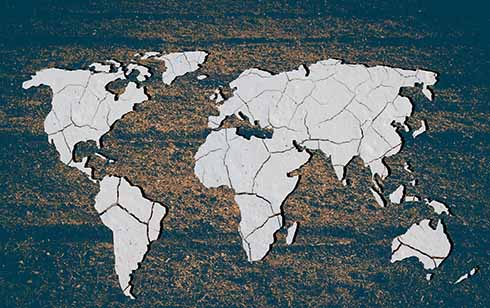 Desertification is the degradation of land in arid, semi-arid and dry sub-humid areas. The UN World Day to Combat Desertification will be held on 17 June.
Desertification is the degradation of land in arid, semi-arid and dry sub-humid areas. The UN World Day to Combat Desertification will be held on 17 June.
Human beings have always had to endure drought and deal with deserts. In the Old Testament Elijah meets a widow and child on the edge of death by starvation in a drought. In Jesus’ life the desert was central. It was seen as the edge of the human world – a place where human beings only with difficulty could hold on to life and sanity. As an edgy place it was considered inhabited by demons. It was contrasted with the green and well-watered valleys that reflected God’s care for humanity.
Human activity
Deserts and drought were then an unavoidable feature of life, sometimes seen to be sent by God as punishment, but certainly beyond human control. In our world we know that droughts and deserts can be made more acute by global warming, and that global warming is caused by human activity.
When we remove trees from marginal land and cultivate it intensely, we are likely to turn it into desert and may also deplete the underground supply of water. The elements necessary for plant growth are also likely to be leached out. In recent years an increased proportion of the earth has become desert. The rise in temperature around the earth is also likely to lead to more and more severe droughts. Their impact will fall disproportionately on people who are poor, because the poor are forced to settle in ever more marginal areas.
Respect
This is true not only of developing nations but also of Australia. People who are poor live in less healthy environments.
A commitment to integral justice requires enabling people who are disadvantaged to live decently and connect with society, and also to ensure that we respect our environment so that we can pass it on sustainably to our grandchildren.
We have now become more attentive to the fragility of our environment and to the effects of mining, burning coal and fossil fuels and of land clearing on our world. We can see that the prosperity and fertility of our world depends on establishing good relationships between human beings, and also between human beings and the environment of which we are part. Poverty and the degradation of our world both spring out of a lack of respect for our fellow human beings and for our world. They reflect the pursuit of profit at the expense of respect.
Healing and protection
The remedy for desert and drought making begins with respect: to stop seeking profit at the expense of the environment and people who are poor, and to ask more urgently how we can heal the human wounds of poverty and an abused environment.
If deforestation makes deserts and contributes to global warming, the proper response is to plant out vulnerable areas. It is not to expel native people from their forest habitat so that we can build mines that will poison the surrounding environment, cause sedimentation of rivers and affect fishing in the rivers and the sea.
The proper response is to protect both the environment and culture so that people can thrive.